Cats are often described as obligate carnivores. This designation means that cats must eat animal meat as a primary component of their diet to fulfill their nutritional requirements. Crucially, cats can only obtain certain essential nutrients, such as vitamin A, taurine, and vitamin B12 (cobalamin), from meat sources.
This specific need for nutrients found in animal meat, combined with a limited ability to gain significant nutrition from plant-based foods, indicates that cats are not omnivores. Let’s delve deeper into a cat’s nutritional profile to understand why.
What Exactly Is an Omnivore?
An omnivore is defined as an organism, whether plant or animal, capable of consuming and thriving on both plant and animal matter. Omnivores typically have diets that include both types of food sources, and they often adapt their food intake based on seasonal changes and the availability of different food options.
Omnivores possess the digestive systems necessary to efficiently break down and extract energy and nutrients from both plants and animals. Humans are a prime example of omnivores, as are creatures like pigs, catfish, many types of pet fish, and certain birds, such as crows.
 Raw cat food ingredients including meat, eggs and vegetables displayed on a wooden surface
Raw cat food ingredients including meat, eggs and vegetables displayed on a wooden surface
What Defines a Carnivore?
A carnivore is an organism, plant or animal, that is adapted to consume and survive on the tissues of other animals. Carnivorous animals exhibit diverse feeding strategies. Some are primarily hunters, actively pursuing prey, while others are scavengers, feeding on deceased animals. While a carnivore might occasionally consume plant-based material (for instance, the stomach contents of their prey), plant matter usually constitutes a very small fraction of their overall diet. More importantly, even if they can digest certain plants or plant-derived foods without digestive upset, they often don’t derive significant nutritional value from them.
In biological classification, carnivores are often categorized based on different criteria. One important distinction is that of an obligate carnivore, sometimes referred to as a hypercarnivore. These animals obtain at least 70% of their dietary intake from animal meat. All cat species, including every breed of domesticated cat, are classified as obligate carnivores.
Natural Diet: What Do Cats Eat in the Wild?
The specific diet of a wild cat varies depending on its geographical location, but fundamentally, cats are carnivores and primarily consume meat. Their size dictates that they typically prey on smaller animals such as mice and rats, as well as rabbits and birds. Some wild cats might also eat lizards, snakes, and even small chickens if they are accessible.
Research into the nutritional intake of wild cats has revealed that their diets generally consist of approximately 52–63% protein, 25–46% fat, and only 2–12% carbohydrates.
 A wild cat successfully hunting and catching a rat outdoors
A wild cat successfully hunting and catching a rat outdoors
Vegetarian or Vegan Cats? Is It Possible?
No, cats cannot thrive on a vegetarian diet. Consequently, a vegan diet is also unsuitable for cats. Although cats can safely consume some plants and grains, these ingredients alone cannot fulfill a cat’s metabolic needs for growth, development, tissue repair, activity, reproduction, and other essential bodily functions.
Cats have significantly higher protein requirements than many other animals and need very few carbohydrates. They also have a critical need for substantial amounts of taurine. Taurine is exclusively found in animal proteins, and the high protein levels that cats require cannot be achieved through a vegetarian diet.
Essential Nutrients: Meat-Based Requirements for Cats
Cats will become seriously ill if they do not consume meat. There are specific nutrients that are essential for cats and are primarily, or exclusively, found in meat:
- Taurine: Taurine is an essential amino acid for cats. “Essential” in this context means it must be obtained from their diet because cats cannot produce sufficient amounts of it on their own. Taurine is exclusively found in animal-based proteins and is absent in plants, fruits, and vegetables.
- Arachidonic Acid: Cats lack sufficient levels of the delta-5 and delta-6 desaturase enzymes needed to convert linoleic acid into arachidonic acid, making it an essential dietary fatty acid.
- Vitamin A (as Retinol): Cats lack adequate dioxygenase, the enzyme required to convert beta-carotene into vitamin A. This means cats cannot efficiently derive vitamin A from plant sources; they need preformed vitamin A (retinol) from animal sources.
- Vitamin B12 (Cobalamin): Vitamin B12 is crucial for various enzymatic processes. It is not naturally found in plants, making animal products the primary source.
Image: Illustrating a domestic cat consuming a meat-based wet food, highlighting the palatability and necessity of meat in their diet.
Health Consequences: What If Cats Don’t Eat Meat?
Cats deprived of animal meat for extended periods will eventually die because multiple organ systems are negatively impacted by the lack of sufficient animal-based protein and essential nutrients.
Signs of deficiency in essential nutrients can appear in as little as a week and can be fatal within just 2-3 weeks, depending on various factors related to the cat’s overall health and nutritional status.
In Conclusion: Cats Are Not Omnivores
Cats are definitively carnivores. This means they not only consume meat but also derive essential vitamins, minerals, proteins, and amino acids from animal meat sources that they cannot obtain from plants. A cat’s health will severely decline without meat in its diet, and a vegetarian or vegan diet is not considered appropriate or healthy for domestic cats. Understanding this fundamental aspect of feline nutrition is crucial for responsible cat ownership and ensuring the well-being of your feline companion.

